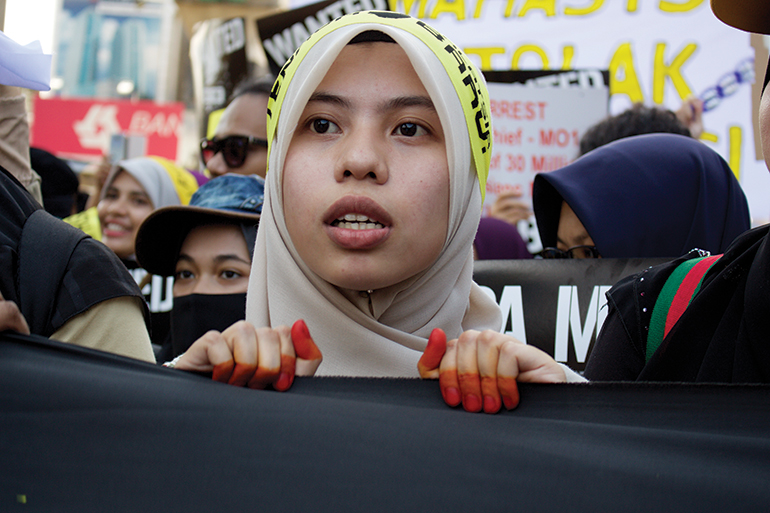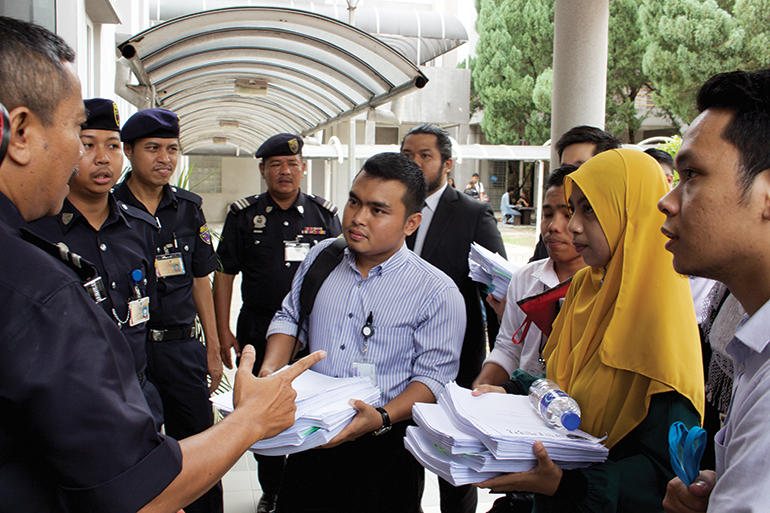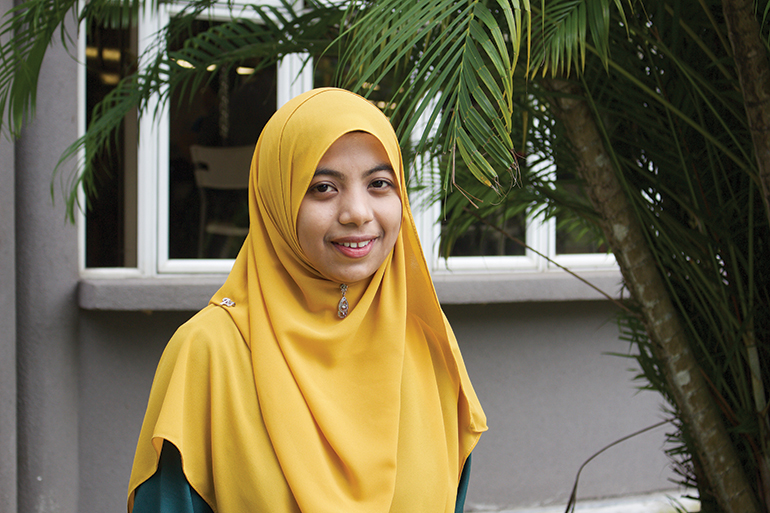On a sunny Saturday morning in November, tens of thousands of Malaysians massed in the steamy streets of Kuala Lumpur. Young and old, from all walks of life, the protesters gathered beneath the elevated tracks of the capital’s light rail and, sitting cross-legged on the road – a faint odour of sweat and urine hanging in the air – listened patiently to a series of speeches by some of the country’s most well-known activists.
Then the drums began. A group of students, shouting slogans and punching the air with their fists, marched confidently out of a side street, rousing the crowd. The rally was suddenly alive.
“Tangkap! Tangkap!” (Arrest! Arrest!) the young men and women shouted, holding aloft giant caricatures of Malaysia’s Prime Minister Najib Razak, his wife and Jho Low, the thirtysomething Malaysian tycoon exposed in international court proceedings as playing a key role in a scandal that has gripped Malaysia.

Since 2015, the nation has been reeling from a multibillion-dollar corruption scandal that has embroiled the 1MDB state investment fund and the prime minister, undermining confidence in what was once one of Southeast Asia’s most vibrant economies.
Billions are thought to have gone missing from the fund, but while investigations overseas continue, there has been little progress in Malaysia, where key investigators and critics have been fired or transferred and the authorities said in early 2016 that the $681m that went into the prime minister’s private bank account was a donation from an anonymous Saudi and not from 1MDB.
The organisation known as Bersih – which means ‘clean’ in Malay – has staged five hugely popular protests since 2007, calling for free and fair elections but also to tackle corruption and the problems at 1MDB. The night before Bersih 5, the most recent protest, which took place in November, police arrested the group’s leader along with several other civil society activists, but if the crackdown was meant to make people think twice about attending, it didn’t work.
The scale of the alleged wrongdoing at 1MDB has mobilised tens of thousands, including a small but energetic coalition of students – despite an education system that is designed to keep them close to the parties in power and discourage activism.
“They tried to deter us,” said Asheeq Ali Sethi Alivi, a law student at Malaysia’s National University who had just been suspended for his activism. “We had to go and hide, but that makes us even more determined. Students want to show their anger.”
Anis Syafiqah Mohd Yusof is the face of the latest generation of student rebels – a Muslim woman, inspired by Noam Chomsky and possessed by a powerful sense of purpose. “[Activism] is part of our learning process,” Anis explained in an interview in the canteen at the University of Malaya, Malaysia’s most prestigious university, where she is studying Arabic. “For three or four years we might be students, but we are Malaysians even after we finish our studies. This is for our future – and the coming generations.”
The 24-year-old shot to national prominence after she organised the ‘Tangkap MO1’ protest in August. The 1,500 students who joined the rally called for “Malaysian Official 1” named in a suit brought by the US Department of Justice (DOJ) – alongside Low and Riza Aziz, Najib’s stepson whose production company was behind the movie Wolf of Wall Street – to be identified and prosecuted. The following month, a government minister acknowledged that Malaysian Official 1 was indeed Najib, who has strenuously denied any wrongdoing over 1MDB.

“Citizens from another country know about what is happening, but there’s no response [in Malaysia],” Anis said. “We feel ashamed if we keep quiet when we know, and are aware about, what is happening. We are being robbed.”
In the wake of Tangkap MO1, Anis was questioned by police for sedition and ‘activities detrimental to parliamentary democracy’. On the eve of Bersih 5, as she was making banners at home, the police came for her again. She said they took her into custody and questioned her, without a lawyer, for five hours.
Then, four other people – she doesn’t think they were police – came to speak to her. They wanted to know why she was protesting and tried to convince her she should be grateful to the government because it was paying for her studies. “It was brainwashing, mental torture,” she said. She was unmoved.
After nearly 48 hours, Anis was released. Her father, a teacher, sent her a message of support: “Don’t give up. Teruskan [Continue],” it said.
Malaysian universities have long existed in an environment of “intellectual containment” designed to help the government maintain control of academics and students, said Meredith Weiss, associate professor of political science at the University at Albany, State University of New York, and the author of the book Student Activism in Malaysia.
The government’s most potent weapon is the Universities and University Colleges Act (UUCA) of 1971, which limits students’ political activities – despite amendments in 2012 – and gives the government the power to appoint universities’ senior leadership. Under the act, academic administrators can “regulate” student activities and penalise transgressions. Even private universities are cautious. The Malaysian campus of Australia’s Monash University attracted widespread criticism when it warned its students not to attend Bersih 5.
Then there are laws such as the Sedition Act, a remnant of British colonial rule, which criminalise free speech and peaceful protest and add to what Human Rights Watch calls a “climate of fear”. Nevertheless, during pivotal moments in Malaysia’s post-independence history, and particularly at elite universities around Kuala Lumpur, students have made their voices heard.
The government insists it wants to improve critical thinking skills and create an education system better suited to the economies of the 21st century, but just before the MO1 rally, higher education minister Idris Jusoh reminded students they should concentrate on their studies, noting the government spends $3,575 (MYR16,000) a year on educating each of them. The minister declined a Southeast Asia Globe request for an interview.
“I don’t think they are interested in critical thinking,” said Ho Chi Yang, a 21-year-old language student who heads the Association of New Youth at the University of Malaya and joined both the Tangkap MO1 and Bersih rallies. “They think we should just follow and be obedient. This is the culture they’ve created from primary school through the whole education system.”
Ho and his friends also attempted a protest at a talk held on campus by the controversial chief executive of 1MDB, Arul Kanda. Such a platform is rarely afforded to opposition politicians or government critics. In 2014, when University of Malaya students invited Anwar Ibrahim, then leader of the opposition, to speak, the lights were turned off and the university disciplined the eight students who organised the event, fining four of them up to $135 (MYR600) each.
But Kanda’s talk was organised by the university in cooperation with Jabatan Hal Ehwal Khas, the ‘special affairs’ unit of the Ministry of Communications and Multimedia, and each student was handed a specially prepared 20-page booklet headlined “Saman DOJ Meragukan” (Doubts about the DOJ Suit). The publication suggested a high-profile asset seizure carried out as part of the investigation was little more than US electioneering and stated repeatedly that the prime minister had not been accused of a crime. No one who had raised concerns about 1MDB was there to question Kanda, who reeled off financial data and insisted the fund was sorting itself out, according to those who were there.

Ho was worried the forum was an attempt to “brainwash” the more impressionable students among the 400 or so who attended. He smuggled in handmade banners questioning 1MDB’s missing billions and the government’s response, and sat patiently through the former investment banker’s talk, as well as the questions that came afterwards. As mementoes were exchanged, he and his friends pulled out the placards. In the commotion that followed, the banners were torn, and the group was ordered out of the hall. They now face disciplinary action this month.
Anis and three other students who organised the Tangkap MO1 rally were called to defend their actions in December, accused by the university administration of a number of charges, including acting in a manner detrimental to their university’s reputation. All four students were found “guilty” and three, including Anis, were suspended for six months. They were also fined $90 (MYR400) each. Officials declined a request for an interview.
The students are mindful that not everyone on campus is supportive of their activist approach – a food fair held at the same time as a gathering for Anis and her fellow students attracted considerably larger crowds. It is hard, too, to gauge the scale of support in universities beyond the main cities, where students have always been more vocal.
But the latest generation of activists say they won’t back down. At the end of December, Anis and the three students disciplined alongside her sued the government, questioning the validity of laws they say limit their freedom of expression. The students disciplined for inviting Anwar to campus also took their case to court – judges ruled in their favour last July. “The law is on our side,” Anis said. “We have a right to voice out and assemble peacefully. Why should we be afraid?”


